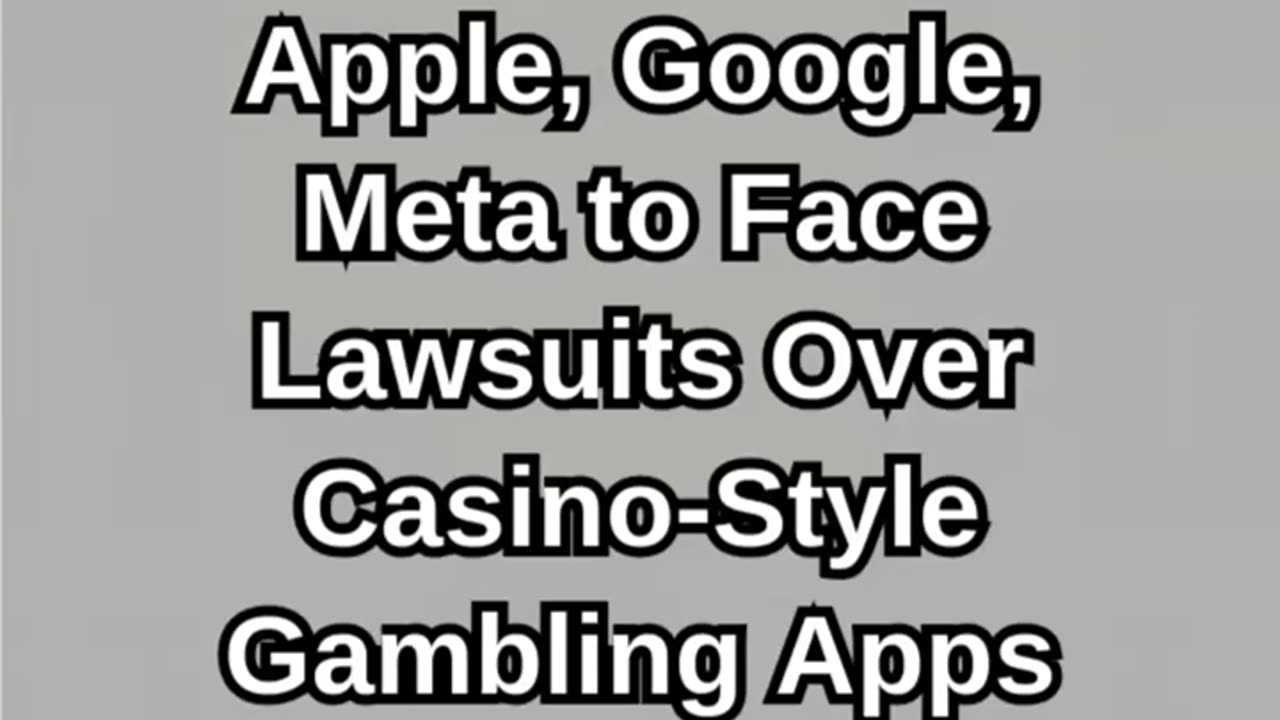Premium Only Content

Apple, Google, Meta to Face Lawsuits
Apple, Google, and Meta are facing increased legal pressure after a U.S. federal judge ruled that they must confront lawsuits tied to casino-style gambling apps hosted on their platforms.
Go here to find out what tools we are using each day to be successful in our business.
https://versaaihub.com/resources/
https://versaaihub.com/media-and-entertainment/
https://www.instagram.com/versaaihub/
https://x.com/VersaAIHub
https://www.youtube.com/@VideoProgressions
https://www.youtube.com/@MetaDiskFinancial
The decision marks a significant step in holding major tech companies accountable for how their app stores and advertising systems may promote addictive and potentially unlawful digital gambling experiences.
The lawsuits claim that these companies were not simply neutral platforms but active participants in facilitating gambling-like activities. Social casino apps often simulate slot machines, poker, and roulette, allowing users to purchase virtual chips with real money. While players cannot legally cash out their winnings, critics argue that the psychological design of these apps mirrors real gambling, encouraging users to spend heavily without meaningful payout.
Plaintiffs allege that Apple, Google, and Meta profited directly by processing payments and taking commissions—reportedly up to 30%—on in-app chip purchases. Additionally, the companies allegedly provided targeted advertising and user data analytics that helped push these apps toward vulnerable users, amplifying the risk of gambling addiction.
In their defense, the tech giants argued that they should be protected under Section 230 of the Communications Decency Act, which shields platforms from liability over third-party content. They also insisted that their role was limited to app distribution and payment processing, not the design or operation of the casino apps themselves. However, the court found that Section 230 immunity does not necessarily cover claims connected to payment processing and direct revenue streams.
Judge Edward Davila’s ruling highlighted that the companies may not be viewed solely as content publishers. Instead, their deeper involvement in the ecosystem—through commissions and infrastructure—could make them liable for enabling illegal gambling practices. While some state law claims were dismissed, the majority of consumer protection and gambling-related allegations remain active.
The outcome of this case could set a powerful precedent. If Apple, Google, and Meta are ultimately held responsible, it could reshape how app stores regulate social casino apps and similar digital products. It may also force broader changes in how platforms vet, approve, and monetize apps that involve virtual currencies and simulated gambling mechanics.
For consumers, the case underscores the growing scrutiny around digital addiction and the blurred lines between entertainment and exploitation in online games. As the lawsuits proceed, the tech world will be watching closely to see whether this ruling opens the door for new accountability standards across the industry.
Go here to find out what tools we are using each day to be successful in our business.
https://versaaihub.com/resources/
https://versaaihub.com/media-and-entertainment/
https://www.instagram.com/versaaihub/
https://x.com/VersaAIHub
https://www.youtube.com/@VideoProgressions
https://www.youtube.com/@MetaDiskFinancial
#Apple, #Google, #Meta, #CasinoApps, #GamblingApps, #TechLawsuit, #DigitalGambling, #SocialCasino, #AppStore, #PlayStore, #Facebook, #Section230, #ConsumerProtection, #LegalRuling, #TechAccountability, #OnlineGambling, #VirtualChips, #DigitalAddiction, #ClassAction, #TechRegulation
-
 0:53
0:53
WFH University
1 day agoAI Is Revolutionizing Learning for Students
14 -
 LIVE
LIVE
MattMorseTV
4 hours ago $3.90 earned🔴CHILLING + TALKING🔴
501 watching -
 LIVE
LIVE
The Charlie Kirk Show
1 hour agoTHOUGHTCRIME Ep. 99 — THOUGHTCRIME IRL
6,266 watching -
 LIVE
LIVE
Flyover Conservatives
9 hours agoSilver Shortage ALERT: London Vaults Running Dry in 4 Months- Dr. Kirk Elliott; 3 Tips to Transform Your Business - Clay Clark | FOC Show
217 watching -
 1:10:18
1:10:18
Glenn Greenwald
3 hours agoIsrael Pays Influencers $7,000 Per Post in Desperate Propaganda Push: With Journalist Nick Cleveland-Stout; How to "Drink Your Way Sober" With Author Katie Herzog | SYSTEM UPDATE #525
54.9K44 -
 38:54
38:54
Donald Trump Jr.
7 hours agoDems' Meme Meltdown, Plus why California Fire Victims should be more Outraged than Ever | TRIGGERED Ep.279
95.2K74 -
 LIVE
LIVE
megimu32
1 hour agoOn The Subject: Meg’s Birthday Bash! 🎂🎶
141 watching -
 23:47
23:47
Jasmin Laine
5 hours agoALL HELL BREAKS LOOSE—Eby MELTS DOWN While Poilievre CORNERS Carney
7859 -
 LIVE
LIVE
SpartakusLIVE
3 hours agoNEW Black Ops 7 BETA || WZ too! And PUBG later?
180 watching -
 1:00:02
1:00:02
BonginoReport
5 hours agoTerror Strikes Manchester Again - Nightly Scroll w/ Hayley Caronia (Ep.147)
75.3K51
